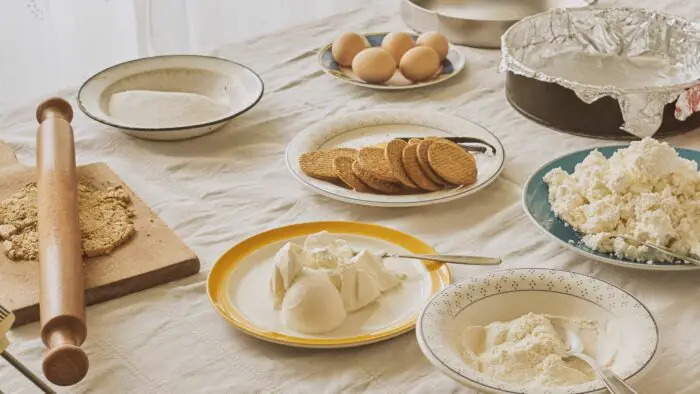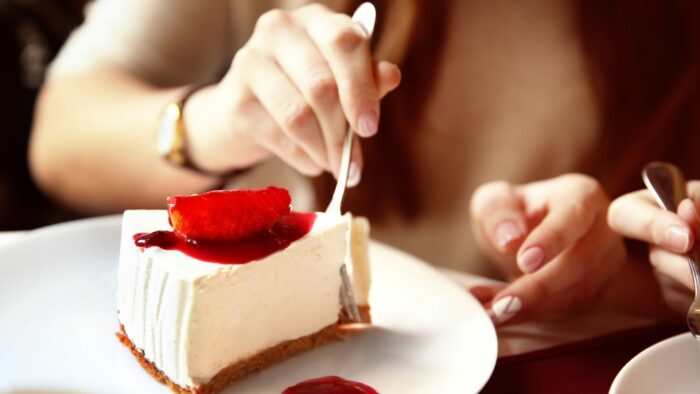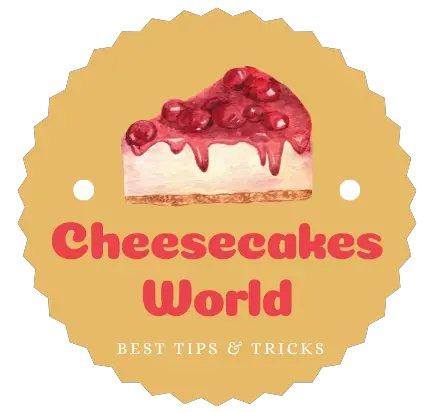By Lindy Van Schalkwyk, last updated on October 3, 2024
Is cheesecake good for you? Today we take a look at the calorie count and nutrient breakdown of this sweet treat! The results may surprise you!
Is Cheesecake Healthy? Is Cheesecake Good For You?
The term “healthy” is extremely relevant. Healthy to you may mean that something should be gluten-free or dairy-free. To another person, it may mean “low in sugar.” And to us, it may mean “low in calories.” Healthy food is relative.
So, before you ever try to answer the question, “Is cheesecake good for you?” first ask yourself what “good” means.
In this jam-packed article, we will take a look at the many faces of a cheesecake. That includes what nutrients it does contain, how much fat, protein, sugars, and carbs it has, and what other nutritional or dietary benefits it does offer.
But, before we get started, first a disclaimer: cheesecake is not the healthiest meal out there. It will never be! No matter how many low-fat dairy products you use or the sugar alternatives you try, a cheesecake will still contain more calories than you would like.
So, our approach to this issue is eating in moderation. Even too much of a good “healthy” ingredient (like oranges) has its side effects.
Okay, now that the preaching is over, let’s answer “Is cheesecake good for you?”
How Many Calories Does A Cheesecake Have?
Like everything we are going to be looking at today, the exact number of calories a cheesecake has is relative. It depends on the type of cheesecake you are making, the type of ingredients you use, and the size of the slice.
On average, a slice of cheesecake is about 100 grams.
A slice of Cheesecake Factory’s Caramelicious Cheesecake With Snickers contains about 1370 calories per slice. But, their Low-Licious Cheesecake contains 570 calories per slice.
As you can see, that’s a massive difference. Luckily, there are a couple of averages you can follow.
Your average New York baked cheesecake will contain between 220-510 calories per slice, depending on the size.
A no-bake cheesecake generally contains fewer ingredients, which automatically makes it lower in calories. Each slice contains roughly 280-400 calories, again, depending on the size of the slice.
The numbers above only account for the cheesecake filling with a basic graham cracker crust. It doesn’t include any toppings.
Where do the calories come from?
One of the most shocking cheesecake facts is that virtually every ingredient used is high in calories. There are ways you can reduce it, but for an authentic, creamy, and lush cheesecake, it’s best to use the originally called-for ingredients.
So, let’s break it down. This way, you will better understand or decide your answer to “is cheesecake good for you.”

Cream cheese
On average, an ounce of cream cheese (30 grams) contains 97 calories. The average unbaked and baked cheesecake uses at least 16 ounces of cream cheese. That’s 1552 calories per 16 ounces of cream cheese.
Even low-fat cream cheese is still pretty calorie-dense. 1 ounce contains 72 calories. So, for a 16-ounce cream cheese portion, you are looking at 1152 calories.
When you only look at this number, it may feel like we are leaning more towards “no” when breaking down “Is cheesecake good for you?” But remember, this can be divided by 8 or 10 portions.
Sugar
Sugar is very high in calories. On average, a cheesecake recipe contains about 3/4 to 1 1/2 cups of sugar (just in the batter). That works out to between 580-1159 calories.
Now, how much sugar is in a slice of cheesecake? That depends on what the recipe calls for. With most recipes, you can reduce the amount of sugar slightly. But on average, a 100-gram slice of cheesecake will contain 22 grams of sugar. This doesn’t include any sugar in the topping itself.
Cream
1 cup of heavy whipping cream contains between 750-850 calories. The number varies depending on the brand you are using.
If you use a low-fat cream (light cream), it does lower the calorie count a little. 1 cup contains about 470 calories. But keep in mind, light cream won’t help make the cheesecake uber-rich and creamy. It will still be nice, but not nearly as decadent.
Is Cheesecake Good For You? A Nutritional Breakdown
Now that you better understand the calories of a cheesecake and where it comes from, let’s break down some other nutrients in this baked dessert.
If we take your average 100-gram slice of cheesecake, it contains 300 calories. Most of these calories come from fat (in the dairy ingredients).
This slice will contain about 23 grams of fat. It is also high in cholesterol. It makes up about 19% of your daily recommended intake.
It is very high in carbs, but most of this comes from sugar, not dietary fiber. A single slice of cheesecake contains about 22 grams of sugar.
And, for protein, cheesecake has about 5-6 grams per slice. It’s not very high, but at least there is a little bit there.
Keep in mind, these numbers will increase if you have a bigger slice or if the cheesecake contains special ingredients and a topping. This data only applies to your average plain vanilla baked cheesecake recipe.
Other nutrients
Cheesecake does also contain a good amount of vitamin A per slice, about 11% of your DRI. It also has a noteworthy amount of calcium and iron, with smaller traces of vitamin C.
As you can imagine, this dessert isn’t loaded with nutrients. But, that doesn’t mean it doesn’t have some benefits to it.

Benefits Of Cheesecake
Unfortunately, this isn’t going to be a very long section. Cheesecake isn’t nutrient-dense and consists mostly of sugar and fats.
But, the nutrients it does contain shouldn’t be ignored.
Cheesecake does contain some protein that comes from cream cheese and eggs. Protein helps build lean muscle, maintains a healthy weight, and quench your hunger. It is a source of energy for your body and helps carry oxygen throughout.
Cream cheese and egg yolks may also help improve your eyesight. Or at the very least, it helps prevent it from degenerating. This is thanks to the high amounts of vitamin A.
Calcium also has a ton of benefits. It helps reduce the risk of cancer and high blood pressure, improves bone and teeth health, and can help control your weight.
And finally, the vitamin E in cheesecake (from the cream cheese) can help protect your skin from aging and general damage caused by pollutants.
Is Cheesecake Good For You? Wrapping Things Up
If you find yourself still wondering “Is cheesecake good for you?” then you can break down the nutritional data of your recipe using a recipe calorie calculator.
Overall, we won’t say that it is bad if you eat cheesecake in moderation. But as always, eat it in moderation. As you can see from our breakdown above, it can quickly get out of hand.
If you enjoyed this educational article, make sure to share it with your fellow calorie counters. And, go take a look at more informative articles like this on our website.
Read more about Healthy Cheesecake Recipe With Greek Yogurt

Lindy Van Schalkwyk is a culinary specialist with a background in Advanced Cooking, Advanced Pâtisserie, Media Communications and Nutrition. She has gained invaluable experience in the culinary industry having worked in some of the top restaurants in Africa in 2016 and 2017. Her expertise in nutrition has enabled her to develop recipes for special dietary needs. In 2018, Lindy began working in the Food Media industry, focusing on recipe development, recipe writing, food writing and food styling.

